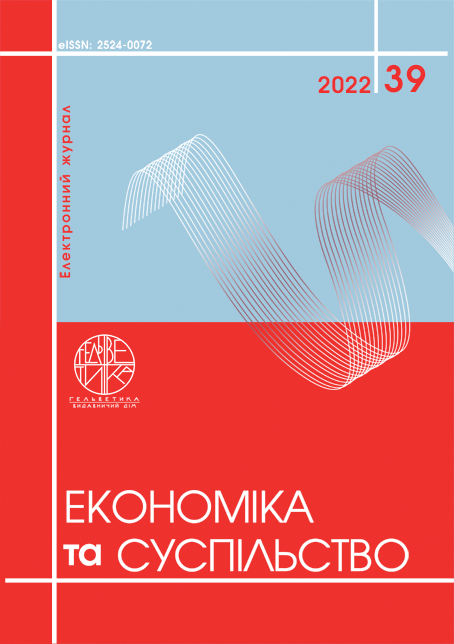STRATEGY FOR EFFECTIVE STATE DEVELOPMENT IN THE CONDITIONS OF GLOBALIZATION
Abstract
When choosing a strategy for effective development of the state should consider and assess the impact on virtually all aspects of its activities. Therefore, the assessment should not be limited to one of the areas (for example, only in the financial projection or in the operational efficiency projection), as this may lead to incorrect data and, consequently, inaccurate forecast of the effect of the strategy. Accordingly, it is necessary to develop an algorithm for evaluating the strategy of effective development, which considers all aspects of the state. existing methods of economic evaluation of the effectiveness of the strategy have serious shortcomings. A promising direction in finding a solution to the problem is to build a methodology that integrates a system of economic indicators into a comprehensive indicator of the effectiveness of strategic solutions in the context of globalization. Currently, there are many schemes and methods for assessing the effectiveness of the state development strategy, but none of them is universal, none considers the full impact of all factors. Therefore, the article develops a three-dimensional model of integrated assessment of the strategy of effective state development in the context of globalization and analyzes aspects that directly affect the effectiveness of the national strategy of state development. The main difference between the effective economic strategy of the state is the uncertainty of the results due to the influence of various external factors, many of which cannot be accurately assessed. The degree of influence of such factors is closely related to the level of risk. The high level of uncertainty indicates that the goals of the analyzed strategy can be achieved. Therefore, in assessing the effectiveness of the strategy, the state needs to assess the risks associated with the implementation of this strategy and forecast the outcome based on the information received. However, modern methods of evaluating an effective development strategy do not consider the risks that may arise in its implementation. Thus, it is advisable to consider such an indicator as the level of risk of economic strategy. Qualitative and quantitative methods should be used to assess the risks associated with the implementation of the strategy. The use of such indicators allows to identify the main risks, to analyze the factors influencing the occurrence of these risks. This technique involves determining the possible harm of this risk and the probability of its occurrence.
References
Заглядывая за горизонт. Концепции и опыт формулирования национальных стратегий Центра экономических исследований. URL: www.cer.uz
Мескон М., Альберт М., Хедоури Ф. Основи менеджменту. Москва : Вільямс, 2009.
Экономика : учебник. 3-е изд., перераб. и доп. / под ред. А. С. Булатова. Москва : Юристъ, 2002. 896 с.
Государственное управление и закон : Доклад о мировом развитии 2017 / Группа Всемирного банка. URL: https://openknowledge.worldbank.org/bitstream/handle/10986/25880/210950ovRU.pdf?sequence=83&isAllowed=y
Білорус О. Г. та ін. Глобальний конкурентний простір : монографія. Київ : КНЕУ, 2007. 680 с.
Кравчук Н.Я. Дивергенція глобального розвитку: сучасна парадигма формування геофінансового простору. Київ : Знання, 2012. 782 с.
Артьомова Т.І. Засади становлення нової системи державного управління господарською діяльністю. Вісник Інституту економіки та прогнозування. 2015. С. 19–25
Колодко Гжегож В. Новий Прагматизм, або економіка помірності. Економіка України. 2013. № 11. С. 13–28.
Ратленд П. Глобализация и посткоммунизм. Международная экономика и международные отношения. 2002. № 4. С. 15–18.
Kholiavko N., Grosu V., Safonov Yu., Zhavoronok A., Cosmulese C.G. Quintuple Helix Model: Investment Aspects of Higher Education Impact on Sustainability. Management Theory and Studies for Rural Business and Infrastructure Development. 2021. Vol. 43. No. 1. P. 111–128. DOI: https://doi.org/10.15544/mts.2021.10
Shmygol N., Galtsova O., Krylov D., Semenov A., Shaposhnykov K. Assessment of the Prospects for Restoring the Financial Security of the State. Financial and credit activities: problems of theory and practice. 2021. № 5(40). Р. 226–235. URL: https://fkd.ubs.edu.ua/index.php/fkd/article/view/3457/3363
Zagliadyvaya za gorizont. kontseptsii i opyt formulirovaniya natsionalnykh strategiy Tsentra ekonomicheskikh issledovaniy [looking beyond the horizon. Concepts and experiences of formu-lating national policies of the Center for Economic Research]. Available at: www.cer.uz.
Meskon M., Albert M., Khedoury F. (2009) Osnovy menedzhmentu [Fundamentals of management]. Moskva: Viliams. (in Ukrainian)
Ekonomika [Economics]. textbook. 3rd ed., revised. and additional / ed. A.S. Bulatova. Moskva: Yurist, 2002. 896 p.
Hosudarstvennoe upravlenye y zakon : Doklad o myrovom razvytyy (2017) [Governance and Law: World Development Report] / World Bank Group. Available at: https://openknowledge.worldbank.org/bitstream/handle/10986/25880/210950ovRU.pdf?sequence=83&isAllowed=y.
Bilorus O. ta in. (2017) Hlobalnyi konkurentnyi prostir: monohrafiia [Global competitive space: monograph]. Kyiv: KNEU, 680 p. (in Ukrainian)
Kravchuk N.Ya. (2012) Dyvergentsiya Globalnoho Rozvytku: Suchasna Paradygma Formuvannya Geofinansovoho Prostoru [The Global Development Divergence: a Modern Paradigm for the Geo Financial Space Formation]. Kyiv: Znannya. (in Ukrainian)
Artiomova T. (2015) Zasady stanovlennya novoi systemy derzhavnoho upravlinnya hospodarskoyu diyalnistyu [Principles of the formation of the new system of government management of economic activities]. Visnyk Instytutu ekonomiky ta prohnozuvannya – Bulletin of Institute for Economics and Forecasting, p. 19–25 (in Ukrainian)
Kolodko Grzegorz W. (2013) Novyi Pragmatizm, ili ekonomika umerennosti [A New Pragmatism or the economy of moderation]. Ekonomika Ukrainy – Economy of Ukraine, No. 11, pp. 13–28. (in Russian)
Ratlend P. (2002) Hlobalyzatsyia y postkommunyzm [Globalization and post-communism]. International economy and international relations. No. 4. P. 15–18.
Kholiavko N., Grosu V., Safonov Yu., Zhavoronok A., Cosmulese C.G. (2021) Quintuple Helix Model: Investment Aspects of Higher Education Impact on Sustainability. Management Theory and Studies for Rural Business and Infrastructure Development. Vol. 43. No. 1. P. 111–128. DOI: https://doi.org/10.15544/mts.2021.10
Shmygol N., Galtsova O., Krylov D., Semenov A., Shaposhnykov K. (2021) Assessment of the Prospects for Restoring the Financial Security of the State. Financial and credit activities: problems of theory and practice. № 5(40). P. 226–235. Available at: https://fkd.ubs.edu.ua/index.php/fkd/article/view/3457/3363


